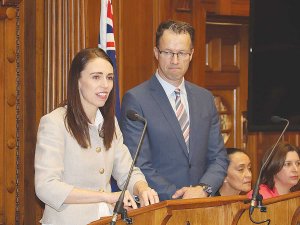Rewarding farmers who embrace sustainability
Winners of DairyNZ’s Sustainability and Stewardship awards in the Ballance Farm Environment Awards have their eyes firmly fixed on progressing a positive future for New Zealand dairy.
 Prime Minister Jacinda Ardern and DairyNZ chief executive Tim Mackle at last week’s announcement in Wellington.
Prime Minister Jacinda Ardern and DairyNZ chief executive Tim Mackle at last week’s announcement in Wellington.
The emissions train is leaving the station and farmers need to be aboard, says DairyNZ chief executive Tim Mackle.
He was responding to last week’s news that the farming sector and the Government have signed a plan to reduce primary sector emissions.
The plan will see the parties together developing practical, cost-effective ways to measure and price emissions at farm level by 2025.
To advance this the Government has introduced the Climate Change Response (Emissions Trading Reform) Amendment Bill due for a first reading next month and then referral to a select committee.
The aim is to reduce farm emissions by 2025, but there is a proviso in the Bill which stipulates that if the independent Climate Change Commission doesn’t think sufficient progress is being made at farm level the Government will intervene.
A five year action plan will include providing better tools for estimating and benchmarking emissions on farms; integrated farm plans that include a climate module; investment in research, development and commercialisation; increased farm advisory capacity; and capability and incentives for early adopters.
The plan is based on a document He Waka Eke Noa – Our Future in Our Hands developed by the primary sector and it negates a proposal on this subject in July of this year.
Prime Minister Jacinda Ardern says the agreement is a world first which moves New Zealand closer to its goal to become the world’s most sustainable food producer.
“We need a plan that supports our environment but also one that support our primary sector. A plan that is practical, innovative and achievable.”
Ardern says it’s great to see primary sector leaders sharing the same aspirations as the Government.
Mackle says the sector is grateful that the Government has listened to the industry and devised a pragmatic solution. In this win win situation the Government wants to get moving forward at the same time as we want the right approach -- a time to work through the issues, he says.
“There are still a lot of details that we have to work through. This gives us time and I think farmers will appreciate that. It’s also certainty for farmers and it gives time to work through these things carefully.
“We must be able to measure things at a farm level and put farm plans in place so that farmers have clarity on what they need to do to manage emissions.”
Mackle says they must continue with R&D of mitigation options.
But he says DairyNZ is not entirely happy with the Government intervention arrangement and doesn’t think it is necessary.
Nine lucky school leavers passionate about farming will join Pamu for a two-year journey into agriculture, living and working at Pamu farm, Aratiatia near Taupo.
Nutritionists are urging Kiwis to kickstart their day with a piece of fresh fruit to help improve their health and wellbeing this autumn.
Under its innovation strategy, Craigmore Sustainables says it is collaborating with new innovators of technology across sustainability, people, animals and business management to enhance New Zealand's dairy sector.
Deeply cynical and completely illogical. That's how Kimberly Crewther, the executive director of DCANZ is describing the Canadian government's flagrant breach of international trade law in refusing to open its market to New Zealand dairy exports.
This week the winner of the prestigious Ahuwhenua Trophy for the top Māori Dairy farm will be announced at a gala dinner in Hamilton.
Once-a-day milking (OAD) can increase or lower the amounts of proteins in milk, according to a new study published in the journal Dairy.
OPINION: Scientists claim to have found a new way to make a substitute for cow's milk that could have a…
OPINION: The Irish have come up with a novel way to measure cow belching, which is said to account for…